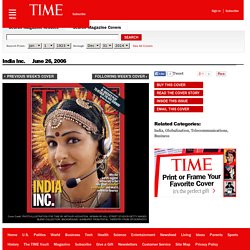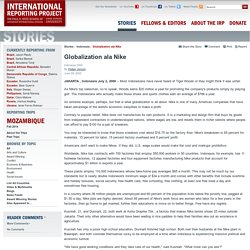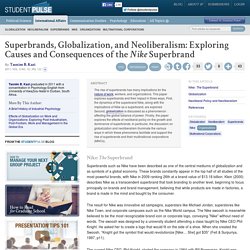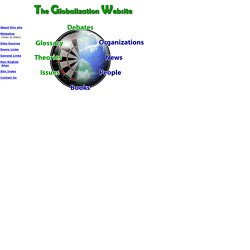

TIME Magazine Cover: India Inc. - June 26, 2006 - India - Globalization - Telecommunications - Business. Cover Credit: PHOTO-ILLUSTRATION FOR TIME BY ARTHUR HOCHSTEIN.

WOMAN BY HILL STREET STUDIOS-GETTY IMAGES BLEND COLLECTION. BACKGROUND: SUNBURST FROM PIXTAL; TAPESTRY FROM ISTOCKPHOTO. Stories - Globalization ala Nike — International Reporting Project. JAKARTA , Indonesia July 2, 2000 -- Most Indonesians have never heard of Tiger Woods or they might think it was unfair.

As Nike's top salesman, so to speak, Woods earns $20 million a year for promoting the company's products simply by playing golf. The Indonesians who actually make those shoes and sports clothes earn an average of $786 a year. An extreme example, perhaps, but that is what globalization is all about. Nike is one of many American companies that have taken advantage of the world's economic inequities to make a profit. Contrary to popular belief, Nike does not manufacture its own products. You may be interested to know that those sneakers cost about $16.75 on the factory floor. Americans don't want to make Nikes. Worldwide, Nike has contracts with 700 factories that employ 550,000 workers in 50 countries. These plants employ 110,000 Indonesians whose take-home pay averages $65 a month. Superbrands, Globalization, and Neoliberalism: Exploring Causes and Consequences of the "Nike" Superbrand.
The rise of superbrands has many implications for the nature of work, workers, and organizations.

This paper explores superbrands and their impact in three ways. First, the dynamics of the superbrand Nike, along with the implications of Nike as a superbrand, are explored. Second, globalization is discussed as a phenomenon affecting the global balance of power. Finally, the paper explores the effects of neoliberal policy on the growth and dominance of superbrands. In particular, the discussion on globalization and neoliberalism illuminate the various ways in which these phenomena facilitate and support the rise of superbrands and their multinational corporations (MNCs).
38 maps that explain the global economy. CQ - QED. From QED < MG | Maps(Link to this page as MG/Maps/CQ) The query form below makes it easy to search for map-related images and articles based on how they have been categorized.

If you wish to see all map-related items, press the Go button without selecting any specific categories. For the purposes of category queries, each category is viewed as the set of articles and media files which have been placed in the category or one of its subcategories, or one of theirs, etc. Select as many or as few categories as you wish in each column, and then press the Go button below. To add a category to your selection, or to deselect a category, hold down the Control key while clicking the left mouse button. In the menus above, the number in parentheses following each category name shows the number of pages (including images) that have specifically been tagged as belonging in that category. Globalisation. Mapping Globalization. GCSE Bitesize: Negative impacts of globalisation. Globalization - Description, Pros and Cons. La mondialisation vue de France et des États-Unis : discussion sémantique contre débat médiatique. Si le terme « global » est apparu en anglais voici plus de 400 ans, en revanche, l’utilisation du concept de globalisation ( globalization en américain) ne remonte qu’aux années soixante.

En effet, le premier dictionnaire à en donner une définition est le Webster [1] Noah Webster publie son premier dictionnaire anglais... [1] en 1961 (Merriam-Webster, 1961). Cependant, le terme globalisation n’a émergé dans le monde universitaire anglo-saxon qu’à la fin des années quatre-vingt et n’est devenu véritablement à la mode qu’au début des années quatre-vingt-dix, suscitant quantité de livres et d’articles scientifiques mais aussi de productions grand public.
D’après une recherche réalisée par Newsweek dans les quarante principaux magazines et journaux de langue anglaise, on ne relevait, en 1991 que 158 articles comportant le terme de globalisation contre pas moins de 17 638 articles en 2000 ! En revanche, la mondialisation, pour L. Thomas L. Dans The world is flat, T.
Special Reports. The Globalization Website. About this site Metasites (links to links) Data Sources Emory Links General Links Non-English Sites Site Index.
